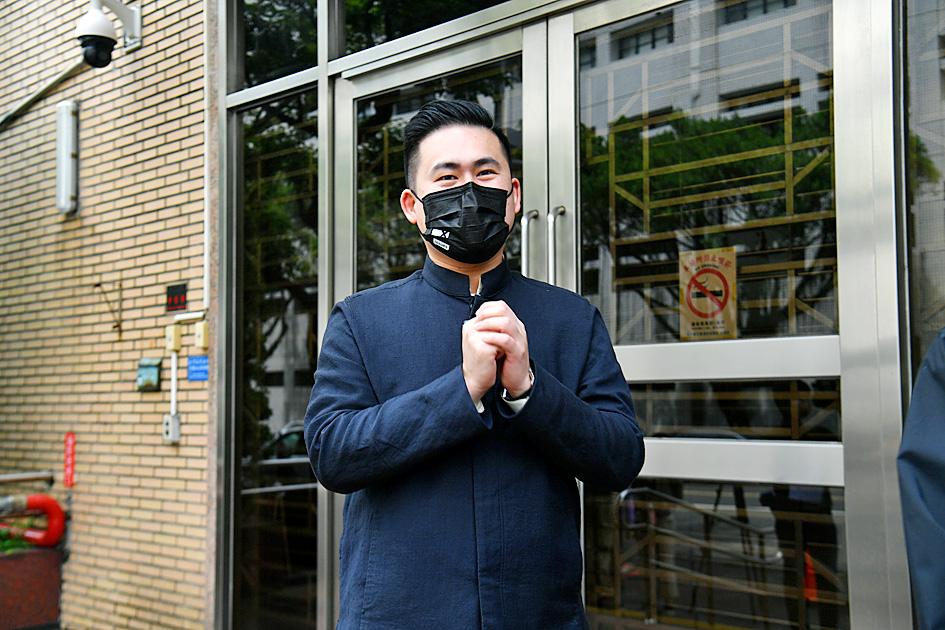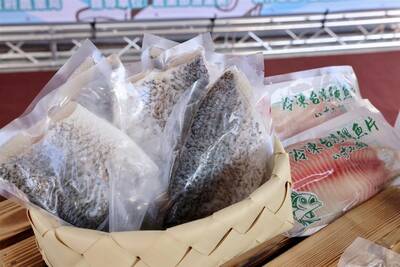The High Court’s acquittal of the New Party’s Wang Ping-chung (王炳忠) on spying charges showed that judges do not understand how severely Chinese espionage undermines Taiwan’s democracy, two legal experts said yesterday.
The High Court on Friday acquitted Wang; fellow New Party members Ho Han-ting (侯漢廷) and Lin Ming-cheng (林明正); Wang’s father, Wang Chin-pu (王進步); and Chinese student Zhou Hongxu (周泓旭) of espionage charges in a ruling that upheld a Taipei District Court acquittal in April last year.
They were indicted in June 2018 over alleged breaches of the National Security Act (國家安全法), after they were accused of receiving funding from entities controlled by the Chinese People’s Liberation Army, which prosecutors said they used to set up propaganda Web sites.

Photo: CNA
Zhou was in 2017 convicted in a separate case of spying for China and sentenced to 14 months in prison.
Taipei prosecutor Lin Da (林達) said that as China updates and increases its online disinformation campaigns and cyberattacks on Taiwan, “judiciary officials and existing laws have not kept up,” and have proven to be an “insufficient defense mechanism” against espionage.
Taiwanese have long felt that judges lack an understanding of the serious harm Chinese spying has on society, Lin Da said.
Earlier this month, the Hualien District Court sentenced Yin Yuan-cheng (尹垣程), the administrator of two Facebook groups, to three months in prison for spreading misinformation about COVID-19, after he was arrested in December 2020 for allegedly spreading disinformation as an agent of the Chinese government.
“China and its cyberarmy take advantage of Taiwan’s freedom and democracy to engage in cognitive warfare to subvert Taiwan’s democracy,” Lin Da said. “When judges give lenient sentences or acquittals in these cases, they harm national security, as China will be even more brazen in conducting espionage with more sophisticated methods.”
Lin Da said that Beijing believes it can influence Taiwan slowly, and that Taiwanese would have trouble perceiving the gradual abuse of free speech and manipulation of public opinion.
“It looks to many people like the judges are encouraging China to conduct more covert activities,” said attorney Huang Di-ying (黃帝穎), who is chairman of the Taiwan Forever Society.
Huang said that the defendants acquitted in Friday’s cases were accused of developing a spy network for China by setting up youth and student organizations, and online chat groups, but the court ruled that prosecutors lacked clear evidence that they were operating as spies and that their actions did not present a “clear and immediate danger” to national security.
The ruling was contrary to most people’s expectations and counter to prevailing interpretations of laws, he said.
“This and other recent cases show that the courts are letting Chinese proxies off the hook on very shaky reasoning,” he said. “Judges are giving Chinese operatives the green light to come to Taiwan to infiltrate our society.”
Taiwan should learn from Australia and the US how to get tough on espionage cases, as they have amended national security laws and enacted statutes on foreign proxies, he said.

Taiwan's Vice President Hsiao Bi-khim (蕭美琴) said Saturday that she would not be intimidated by the Chinese Communist Party (CCP), following reports that Chinese agents planned to ram her car during a visit to the Czech Republic last year. "I had a great visit to Prague & thank the Czech authorities for their hospitality & ensuring my safety," Hsiao said on social media platform X. "The CCP's unlawful activities will NOT intimidate me from voicing Taiwan's interests in the international community," she wrote. Hsiao visited the Czech Republic on March 18 last year as vice president-elect and met with Czech Senate leadership, including

There have been clear signs of Chinese Communist Party (CCP) attempts to interfere in the nationwide recall vote on July 26 in support of Chinese Nationalist Party (KMT) legislators facing recall, an unnamed government official said, warning about possible further actions. The CCP is actively involved in Taiwanese politics, and interference in the recall vote is to be expected, with multiple Chinese state media and TAO attempts to discredit the Democratic Progressive Party (DPP) and undermine public support of their recall movement, the official said. This interference includes a smear campaign initiated this month by a pro-Beijing Hong Kong news outlet against

A week-long exhibition on modern Tibetan history and the Dalai Lama’s global advocacy opened yesterday in Taipei, featuring quotes and artworks highlighting human rights and China’s ongoing repression of Tibetans, Hong Kongers and Uighurs. The exhibition, the first organized by the Human Rights Network for Tibet and Taiwan (HRNTT), is titled “From the Snowy Ridges to the Ocean of Wisdom.” “It would be impossible for Tibetans inside Tibet to hold an exhibition like this — we can do it. because we live in a free and democratic country,” HRNTT secretary-general Tashi Tsering said. Tashi Tsering, a Taiwan-based Tibetan who has never

A first shipment of five tons of Taiwan tilapia was sent from Tainan to Singapore on Wednesday, following an order valued at NT$600,000 (US$20,500) placed with a company in the city. The products, including frozen whole fish and pre- cooked fish belly, were dispatched from Jiangjun Fishing Harbor, where a new aquatic processing and logistics center is under construction. At the launch, Tainan Mayor Huang Wei-che (黃偉哲) called the move a “breakthrough,” marking Taiwan’s expansion into the Singaporean tilapia market. Taiwan’s tilapia exports have traditionally focused on the United States, Canada, and the Middle East, Huang said, adding that the new foothold in